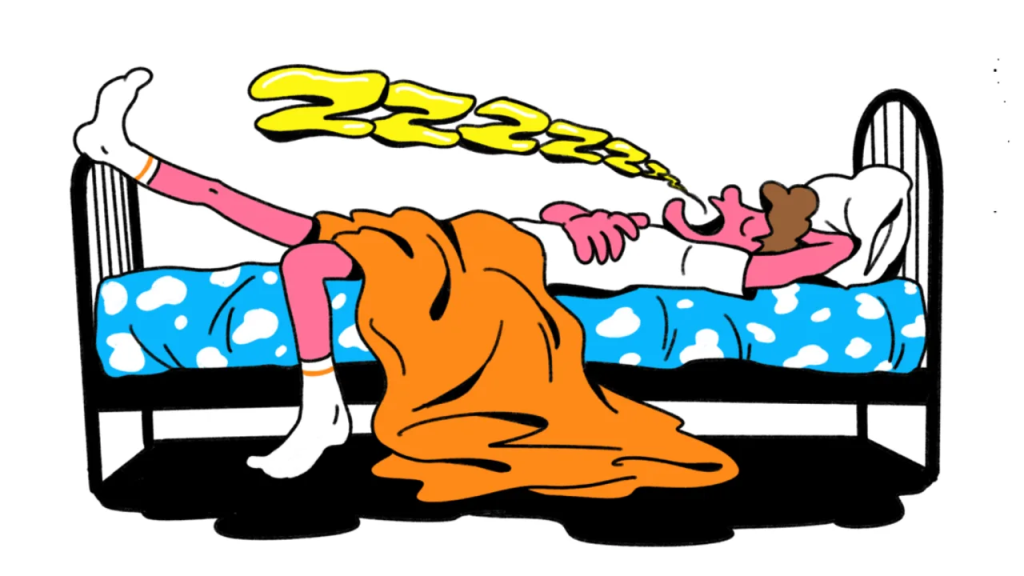Living with a stuffy nose is no fun, but James Nestor was prepared. Besides, it was for science…
While doing research for his book “Breath: The New Science of a Lost Art,” Nestor let scientists at Stanford University plug his nostrils with silicone and surgical tape to measure the impact of breathing through his mouth for 10 days.
“We knew it wasn’t going to be positive, because there is a very strong scientific basis showing all the harmful effects of mouth breathing, from periodontal disease to metabolic disorders,” Nestor explains.
The surprise was how quickly the experiment affected him.
Nestor’s blood pressure rose 13 points, bringing him to level one hypertension. Heart rate variability measurements showed that his body was in a state of stress. His pulse was elevated and he was reeling with mental fog.
He also snored for hours each night, developing obstructive sleep apnea. His blood oxygen levels dropped.
“We had no idea it was going to be this serious,” Nestor says. “The snoring and sleep apnea were so dramatic, and came on so quickly, that everyone was very surprised.”
What Nestor learned, aside from the dangers of being a research subject, was that mouth breathing can ruin a good night’s sleep.
Scientists have found that mouth breathing at night increases the risk of sleep disorders such as snoring, sleep apnea and hypopnea (partial air obstruction). Each of these, in turn, can lead to daytime fatigue.
That doesn’t mean you’re doomed to wake up groggy because you’re prone to mouth breathing in your sleep.
Experts have a long list of strategies designed to turn you into a nasal breather, including a low-cost breathing trick you can buy at the corner store.
What are the causes of mouth breathing at night?
There is a long list of reasons why people mouth-breathe at night, says Dr. Steven Park, a surgeon specializing in Sleep Medicine.
“The most common reason is nasal congestion,” Park explains. “From allergies, or if you have a deviated septum. Many medications can also cause nasal congestion.”
Those problems are exacerbated when lying down, he explained.
“Usually when you lie down, the blood vessels inside the nose fill up with blood,” he explains. If you can’t breathe easily through your nose, you’re likely to open your mouth in search of air, Park explains. This triggers a positive feedback loop.
“You might think that if you open your mouth you breathe better, but the opposite is actually true,” he explains. When you open your jaws, your tongue pulls back and obstructs your airway. “Even if you don’t have sleep apnea, or you have mild sleep apnea, opening your mouth makes it much, much worse.”
Are your sleep habits unhealthy? These 5 tips can help you get a good night’s sleep
How do you know if you’re breathing through your mouth at night? According to Park, many people are alerted by their spouse or partner when they realize they are mouth breathing.
If you wake up with a dry mouth or persistent tiredness, these may be warning signs. Another sign of sleep apnea or other sleep disturbances is having to go to the bathroom several times a night, Park explains. Interrupted breathing stresses the heart, Park points out, which triggers the release of hormones that cause increased urine production.

How to stop mouth breathing
When Nestor held his nose for scientific reasons, he experienced an extreme version of mouth breathing. But, in retrospect, he realized that he had been waking up with a dry mouth for some time, a sign that he had given up nasal breathing for at least part of the night.
If you’re dealing with nighttime mouth breathing, Park suggested you start by taking care of your nose to minimize congestion.
“First, avoid eating close to bedtime,” he said. This is because gastric juices can get into the nose, sinuses, ears and mouth, causing congestion and inflammation.
Park also recommended nasal saline irrigation, flushing the nose with salt water in a squeeze bottle. “It’s a gentle decongestant, because the salt water draws clear water out of the membrane,” he explains. (Over-the-counter decongestant sprays can cause habituation and rebound symptoms, Park said, and should be reserved for short-term use.)
Respiratory problems are so widespread that they have spurred an entire industry devoted to unclogging the nose. According to Park, some people find relief from nasal strips, which open the nose from the outside, or nasal dilators, which expand the air passages from the inside.
But even if you manage to clear your nose, mouth breathing at night can be a difficult habit to break. That’s why some people look for products that ensure the lips are sealed at night.
Many experts warn of the danger of covering your mouth while sleeping.
“If you have obstructive sleep apnea, yes, it can be very dangerous,” said sleep specialist Dr. Raj Dasgupta, associate professor of Clinical Medicine at the University of Southern California Keck School of Medicine, in a previous CNN article.
“There is limited evidence on the benefits of mouth bandaging and I would be very careful, and even talk to your doctor before trying it,” Dasgupta added.
Dasgupta recommended consulting an otolaryngologist or sleep specialist for a diagnosis and treatment plan.
TYT Newsroom



